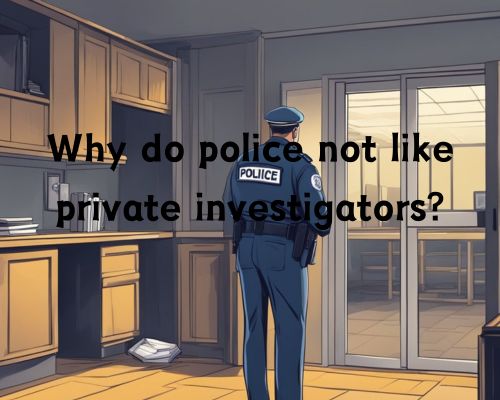When it comes to investigations, private investigators and police detectives often work towards the same goal of solving a case. However, there can be tension between the two professions, with some police officers expressing dislike towards private investigators.

One reason for this tension could be competition. Private investigators have become more prevalent in recent years, offering their services to individuals and businesses who may have traditionally turned to law enforcement for help.
This can be seen as a threat to police officers, who may feel that their authority is being challenged. Additionally, private investigators may have access to resources and information that police officers do not, which can further exacerbate this feeling of competition.
Another reason for tension between police officers and private investigators could be a lack of trust. Police officers may view private investigators as untrained and unregulated, which can lead to concerns about their methods and tactics.
Additionally, private investigators are not held to the same standards as police officers when it comes to following the law, which can lead to further mistrust.
Professional Dynamics Between Police and Private Investigators
When it comes to the relationship between police officers and private investigators (PIs), there are several factors that influence their professional dynamics. Understanding these factors can help you comprehend why police officers may not always like private investigators.
Jurisdiction and Authority
One of the primary differences between police officers and private investigators is their jurisdiction and authority. Police officers are sworn law enforcement officers who are authorized to enforce the law and maintain public order within a specific jurisdiction.
In contrast, private investigators operate in the private sector and have limited authority. See Private Investigator near me.
Operational Differences and Skill Sets
Another significant factor that affects the relationship between police officers and PIs is their operational differences and skill sets.
Police officers are highly trained law enforcement professionals who specialize in investigating crimes, making arrests, and gathering evidence.
In contrast, private investigators often specialize in specific areas such as surveillance, background checks, and locating missing persons.
Legal Boundaries and Licensing
The legal boundaries and licensing requirements for police officers and private investigators also play a significant role in their professional dynamics.
Police officers are required to follow specific laws and regulations, and they must be licensed to carry out their duties.
In contrast, private investigators must also follow the law and licensing requirements but operate under different regulations.
Collaboration and Conflict
Private investigators and police officers often work in the same field, but they have different objectives and methods of achieving them. As a result, conflicts can arise between them. However, collaboration between private investigators and police officers is possible and can be beneficial for both parties.
Competition Over Resources and Recognition
One of the main reasons for conflict between private investigators and police officers is competition over resources and recognition. Both groups often compete for the same resources, such as information, evidence, and witnesses.
Additionally, private investigators may feel that their contributions are not recognized by law enforcement agencies, which can lead to frustration and resentment.
Case Interference and Information Sharing
Another potential source of conflict is case interference and information sharing.
Private investigators may be hired to investigate a case that is already being handled by law enforcement agencies. See Private Investigator near me.
In such cases, private investigators may interfere with police investigations, which can lead to conflicts.
Additionally, law enforcement agencies may be reluctant to share information with private investigators, as they may not have the same level of training and expertise as police officers.
Ethical Considerations and Public Perception
The ethical considerations and public perception of private investigators and police officers can also create conflicts between the two groups.
Private investigators are often portrayed in the media as shady characters who operate outside the law. On the other hand, police officers are seen as upholders of the law and protectors of the community.
As a result, private investigators may feel that they are not respected by law enforcement agencies, while police officers may view private investigators as a threat to community safety.
To avoid conflicts between private investigators and police officers, it is important to establish clear lines of communication and respect each other’s roles and responsibilities.
Private investigators should be aware of the legal and ethical boundaries that govern their work. They should also be willing to collaborate with law enforcement agencies when necessary.
Similarly, law enforcement agencies should recognize the contributions that private investigators can make to criminal cases. They should also be willing to share information and resources when appropriate.
Ultimately, collaboration between private investigators and police officers can lead to better outcomes for everyone involved.
